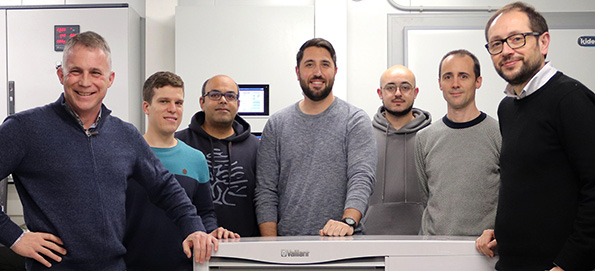UPV-Saunier Duval
The first heat pump for domestic use with zero carbon dioxide emissions has been developed
[ 06/04/2022 ]
A research team from the University Institute for Research in Energy Engineering (IUIIE) of the Universitat Politècnica de València (UPV) and the company Saunier Duval have developed the first heat pump for domestic use that works with refrigerants that do not emit carbon dioxide. Specifically, it uses propane, a natural refrigerant that allows high energy efficiency and has almost zero carbon dioxide equivalent emissions. The development of this unit is the result of three years of collaboration between the IUIIE-UPV researchers and the company that belongs to the Vaillant group.
It is the first domestic commercial unit with zero direct and indirect emissions. Currently, there are already units that use the same technology as ours, which is aerothermal energy, but they do not use a natural fluid such as propane in it. For this reason, our pump can heat homes being totally recpectful with the environment, without emitting carbon dioxide to the atmosphere. Furthermore, its high energy efficiency allows to be classified as renewable energy, by pumping energy from the environment”, underlines José Gonzálvez, Director of the Thermal area at ??the University Institute for Research in Energy Engineering of the Universitat Politècnica de València.
Among its advantages, the heat pump developed by the UPV and Saunier Duval can also generate hot water for heating at temperatures of up to 75ºC with very high energy efficiency, something that is not possible with conventional heat pumps. Additionally, it can be installed not only in newly built buildings, but also to replace gas boilers in existing buildings. And it also allows the application of anti-legionella treatment without requiring external support.
The unit is high efficient (A+++) so for each kWh of electricity consumed, it produces 6.48 kWh of heating for the home. Regarding the production of domestic hot water, for each electrical kWh consumed, it generates 4.43 kWh.
“In the technical development that has been carried out, it has been possible to achieve energy efficiencies similar to those of currently used refrigerants, with high Global Warming Potential (GWP). To do this, we carried out an analysis of the best configuration for vapor compression cycle adapted to the refrigerant used – propane – minimizing the amount used and optimizing the control parameters of the unit”, explains José Gonzálvez.
The University Institute for Research in Energy Engineering (IUIIE) of the Universitat Politècnica de València (UPV) is at the moment a European leader and a world reference in the use of propane as refrigerant. Thanks to this leadership, it works in collaboration with the main national and international companies in the sector, such as the Vaillant group, in the development of increasingly efficient and environmentally friendly appliances. "And for the coming years, the main challenge will be to increase the efficiency of this equipment at low ambient temperatures and provide it with an intelligent system that allows early detection of failures or degradation of its efficiency over time", concludes José Gonzálvez.
Outstanding news
 The Diamond Army
The Diamond Army
Two students came up with the UPV initiative that has engaged more than 1,600 volunteers and shattered the false myth of the 'crystal generation'
 ARWU 2024
ARWU 2024
The Shanghai ranking reaffirms the UPV as the best polytechnic in Spain for yet another year
 Distinction of the Generalitat for Scientific Merit
Distinction of the Generalitat for Scientific Merit
Guanter has been distinguished in recognition of his research excellence in the development of satellite methods for environmental applications
 The new statutes come into force
The new statutes come into force
The Universitat Politècnica de València is the first university in Spain with statutes adapted to the new LOSU
 NanoNIR project against breast cancer
NanoNIR project against breast cancer
UPV Researcher Carla Arnau del Valle receives an EU Marie Curie grant to develop biosensors for the early detection of this cancer
 Large artificial intelligence language models, increasingly unreliable
Large artificial intelligence language models, increasingly unreliable
According to a study by the Universitat Politècnica de València, ValgrAI and the University of Cambridge, published in the journal Nature





